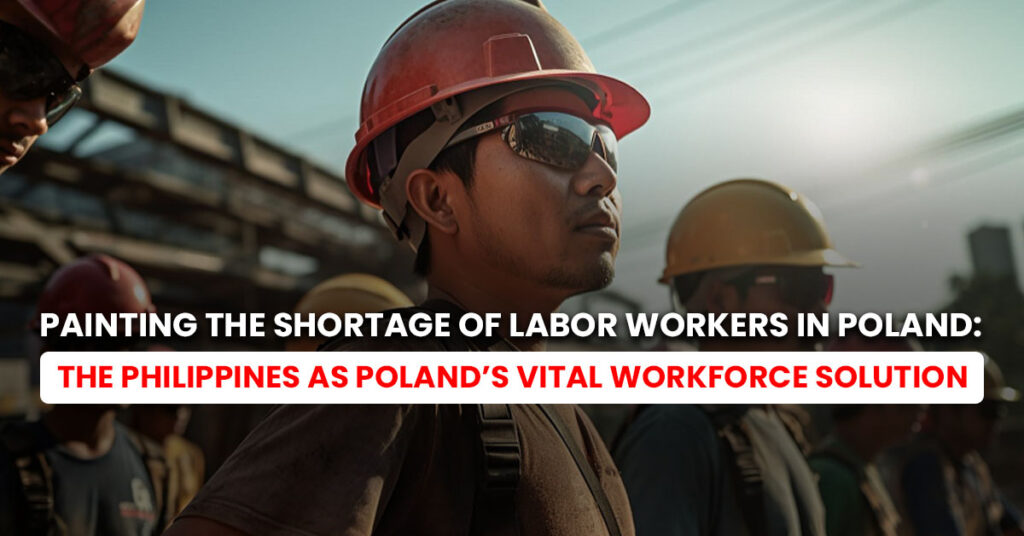Amidst the backdrop of an aging population and the ongoing ramifications of the conflict in Ukraine, Poland finds itself in a pressing predicament – a dire shortage of skilled workforce.
With an increasingly aging population, Poland’s demographic landscape has significantly transformed. This demographic shift has created a critical imbalance in the labor force, denting the labor market, where retirees now outnumber the influx of younger workers. The implications of an aging population are far-reaching, beginning with the mounting pressure on the healthcare sector. In essence, Poland’s first point of concern has created an urgency, where younger and more skilled workers in Poland are needed to sustain the country’s economic vitality.
The Resounding Call for Filipino Workers in Poland to Address This Challenge
In response to the labor crisis, Poland has turned to the Philippines, recognizing the wealth of talent and expertise that Filipino skilled workers bring. This call is not merely about filling employment gaps; it’s a strategic move to rejuvenate Poland’s workforce and catalyze growth across industries.
Filipinos’ expertise and capabilities are in high demand as they step forward to fill the void and propel Poland’s industries forward.
Filipino skilled tradespeople have swiftly become sought-after workers in Poland. Their expertise spans various sectors, from healthcare to construction and beyond, offering a diverse skill set that aligns seamlessly with Poland’s workforce needs. With a reputation for being dedicated and professional, Filipino workers can easily insert themselves into Poland’s labor force, contributing to economic growth and development.
Furthermore, the influx of Filipino skilled workers in Poland addresses the country’s immediate labor shortages and brings long-term advantages. Their contributions help to bridge the demographic divide, injecting vitality into the labor market and bolstering the nation’s competitiveness on the global stage. As they step forward to fill the gap, skilled workers in Poland help actively shape Poland’s future, propelling its industries towards greater prosperity and producing more opportunities for all.
Poland’s Thriving Labor Market
Poland’s economic landscape is characterized by diversity. It boasts a large labor force, a thriving manufacturing sector, and a burgeoning IT industry. However, even with these attributes, the country has grappled with a glaring problem: the shortage of skilled labor. This issue has multifaceted roots and consequences, and addressing it effectively requires short-term and long-term strategies.

Skills Mismatch
A pronounced gap exists between the skills available in the local labor pool and those demanded by employers. This discrepancy often leads to unemployment among specific groups, such as the youth and those in declining industries.

Youth Unemployment
Poland has had relatively high youth unemployment rates. Young people often need help accessing quality education and training aligned with market needs.

Regional Disparities
Major cities like Warsaw and Krakow offer more job opportunities and higher wages than rural areas. This economic divergence has fueled internal migration patterns.

Low Wages
While Poland offers competitive labor costs compared to Western European nations, concerns persist regarding low wages, especially in some sectors. This wage imbalance has triggered a ‘brain drain’ as skilled workers seek higher-paying roles abroad.

Demographics Challenges
Poland’s aging population is another pivotal factor. An increasingly elderly populace necessitates a sustainable influx of younger workers to sustain the pension system and healthcare services.

Labor Migration
Labor migration, both emigration and immigration, plays a vital role in Poland’s labor market dynamics.
The Role of Labor Migration
As with any other country, Poland, too, has a storied history of emigration. Millions of Poles continue to seek better employment opportunities abroad. In a similar regard, the country has experienced immigration, primarily from neighboring countries. This moving in-and-out of people has significantly impacted Poland’s labor landscape.
On Emigration
Polish emigrants, often called the “Polish diaspora,” seek better employment prospects, higher wages, and improved living standards abroad. While they contribute remittances to Poland, their absence can lead to labor shortages in specific sectors and regions.
On Immigration
Poland has attracted immigrants from neighboring countries to fill labor gaps in the construction, agriculture, and healthcare sectors. This inflow of foreign workers helps sustain economic growth and development.
The Philippines: The Labor Solutions for Poland
In the quest to address its labor shortages, Poland has found a valuable ally in the Philippines. The Philippines is aptly positioned to become Poland’s number one workforce solution.
Poland-Philippines Labor Migration Agreement
Both countries entered a bilateral labor migration agreement to facilitate Filipino workers’ legal recruitment and employment in Poland. This agreement streamlined the process, allowing recruitment agencies and employers in Poland to hire Filipino workers for specific job categories in sectors facing labor shortages, including healthcare, construction, and domestic work.
Economic Impact and Benefits
Filipino workers have made significant contributions to Poland’s economy. They fill critical labor shortages, particularly in sectors such as healthcare and construction, and support economic growth. The remittances sent back by these Overseas Filipino Workers (OFWs) contribute to Poland’s income, boosting consumption and investment.
Skills Transfer
Beyond addressing immediate labor shortages, this migration facilitates skills transfer. Filipino workers often acquire valuable skills and experience abroad, which they can bring back to Poland. This “brain gain” supports innovation and competitiveness in various sectors.
Integration and Social Exchange
The presence of Filipino workers in Poland has led to cultural exchange and diversity, enriching the country’s social fabric. While integration challenges exist, both governments have worked to promote social cohesion and ensure fair treatment of migrant workers.
Conclusion: Filipino Workers for Poland
Poland’s labor market demands a sustainable solution to its persistent labor shortages. The Philippines has emerged as the prime solution to this challenge through a bilateral labor migration agreement. With their skills, dedication, and contributions, Filipino workers have played a vital role in supporting Poland’s economic growth while gaining invaluable international experience.
As both nations continue their partnership, addressing challenges and adapting to changing circumstances, the prospects of this labor synergy appear promising, creating a win-win scenario for both Poland and the Philippines.
About Greatways Manpower International, Inc.
At Greatways Manpower International, Inc., we are dedicated to shaping brighter futures through international manpower solutions. As a Philippine-based corporation, our core mission revolves around securing job orders in the global market and responding to them with utmost dedication. This commitment is deeply rooted in the belief that quality manpower can transform lives.
By building great partnerships with clients worldwide, we forge pathways that unite talent with opportunity, creating a world where aspirations know no bounds.
For inquiries, contact us at whatsnew@greatwaysmanpower.com



